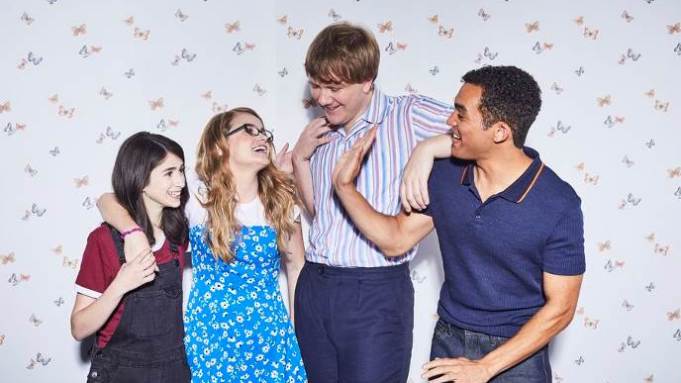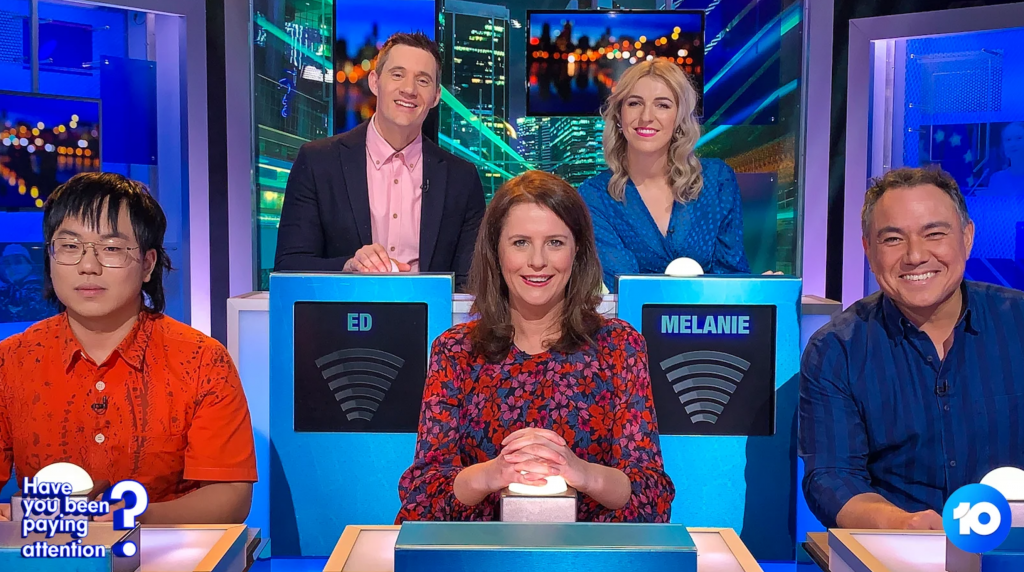Australian Tumbleweeds
Superwog Returns
Superwog is back on both iView (all of season 2) and the ABC, and you know what? We actually enjoyed it. Sure, it’s not as funny as the time Nick Giannopoulos got his lawyers to try and stop comedians from using the word “wog” in their shows, but that remains the pinnacle of wog-based comedy in this country; there’s no shame in standing in that mighty shadow.
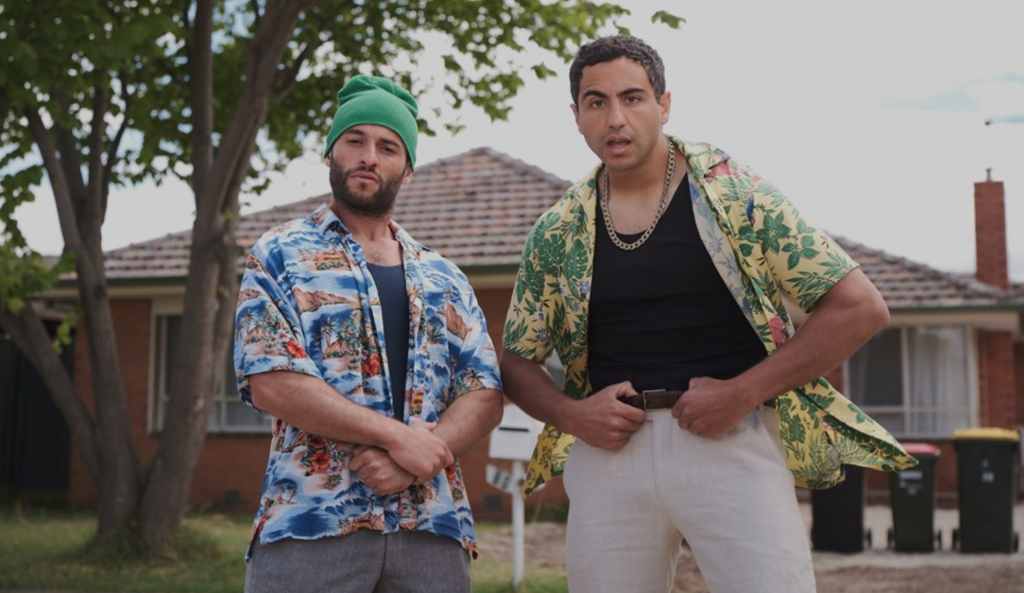
There’s not a lot of moving parts in your average Superwog episode. Superwog (Theodore Saidden) is a teen doing teen shit with his best mate Johnny (Nathan Saidden); his parents (also the Saiddens) are broad comedy stereotypes who remain recognisable enough to get laughs.
The first episode of season 2 has two parallel car-related storylines: Superwog tries to get his P plates, while Wog Dad tries to stop his neighbour from parking out the front of his house. Will Superwog get the angry instructor who fails everyone? Will Wog Dad’s scheme to set up house on the road outside his house pay off? Will there be a fair amount of yelling and flailing about either way?
Most Aussie sitcoms are culturally non-specific; locations and the occasional accent aside, there’s nothing particularly Australian about shows like Rosehaven and How to Stay Married. What they are is firmly middle-class. For some reason, Australian culture is seen as something only poor people have – middle class sitcoms exist in a bland netherworld where the occasional reference to cricket is as local as it gets.
Superwog, on the other hand, is Aussie as – or at least, it’s not afraid to make jokes about things that actually happen to average people in Australia. A major plot point is the importance of giving the thank you wave after another driver lets you in; if you haven’t been pissed off by a neighbour parking their car in front of your house then you probably live in a block of flats. It’s not exactly subtle, but it’s also the kind of comedy we don’t get to see often enough.
(A later episode involves a swooping magpie; good luck pitching that plotline to the US)
“But what about the extensive body of work belonging to one Paul Fenech?” we hear you ask. Yeah, it’s true, once upon a time Fenech had a few real observations about working class / immigrant Australian society scattered in between the shouting and swearing and thonging. But these days? His characters’ aren’t recognisably human, let alone Australian.
Superwog is pretty blunt at times and there’s plenty of shouting and running around, but even the comedy swearing isn’t usually a punchline in itself. And while we’re not talking Seinfeld-level plotting or anything, both plots in the first episode have a beginning, middle and end that make (comedy) sense while being funny all along the way, which isn’t something you can say about most Aussie sitcoms.
Sure, nobody’s claiming that a sequence based around turning on the cold taps while someone’s in the shower is classic comedy or anything. But it’s still funnier than anything on two entire seasons of Squinters.
Hughesy Loses It
Over the last 24 hours or so, millionaire property owner and TV host Dave Hughes has managed to make a bit of a dickhead of himself. Going on social media – and seriously, we could stop right there – to stand up for gyms in the midst of a covid pandemic spread in part by people exerting themselves in confined spaces, he rapidly discovered nobody sensible was on his side and deleted his tweet. Like that ever works!
This isn’t the first time Hughes has gotten himself in hot water on Twitter; last year he seemed to be making fun of Joe Biden’s stutter, which went down about as well as you might expect. But there at least he was just making an ill-informed stab at commenting on the news. Here he’s tapped into a slightly bigger issue.
Australian comedy has always had “elder statesmen” that act like dickheads. Daryl Somers. Daryl Somers. And of course, Daryl Somers. But in the past we also had young up-and-comers pushing their way into the spotlight to balance them out. In 2021 Australian comedy no longer has a spotlight; you’re either just starting out and already looking overseas, or you’ve been around since the 90s.
In itself, not a serious problem: comedy is comedy whatever your age. But the decline in comedy opportunities over the years means that the opportunities to actually be funny have also declined, which means if you’re one-time comedian Dave Hughes most of your career (outside of stand-up) over the last decade or two has been hosting gigs where “funny” means “what a character!” rather than, you know, being funny.
Problem a): the comedy muscles atrophy, and you get one-time comedians who end up thinking people are interested in their opinions, not their amusing comedy opinions. WRONG.
Problem b): as these comedians (and pretty much everyone else in the Australian media) move up in the world, they often, for want of a better term, “lose touch with the common man”. This is why there’s been so much focus over the last year on the effects of lockdown on small business owners: while most people mostly know people who work for a living, successful media people make the kind of money that means they socialise with small business owners. They don’t hang out with personal trainers at the gym, they hang out with the person who owns a chain of gyms.
Covid has been a disease that has created winners and losers in society. If you can work from home in a secure job, then you’re a “winner”; if you work in an essential service that means you have to run around visiting multiple people who may be affected, you’re less of a winner. And if you’re a small businessperson who’s invested heavily in a business that requires a large number of people being packed into a small area for a lengthy period of time, you’re now also somewhat less of a winner.
This has come as a shock to Dave Hughes’ mates small business owners, because for as long as anyone can remember both sides of politics (but mostly the LNP) have treated small business owners as winners. Remember wage theft? Remember working shit jobs in retail? Remember how wages and conditions for low income workers have been rolled back over the last decade?
Suddenly now, just because of some mildly fatal disease, their mates in government are telling them they can’t just do what they like. What the hell? No wonder they’re getting their heads on the news every single night of every single lockdown complaining about pretty much everything.
Dave Hughes’ problem isn’t that he’s an ill-informed nitwit; he’s perfectly well informed on what his mates think is important. His problem is that he’s forgotten what his job is. Any way you slice it, saying what every unhappy small business owner is already saying on FB only with staring dead doll eyes isn’t comedy; if he isn’t trying to be funny, what’s the point of keeping him around?
Vale Everything’s Gonna Be Okay series 2
Josh Thomas’ Everything’s Gonna Be Okay has had a lot of positive media coverage. Often the focus has been on how it has positively and realistically portrayed characters who are neurodiverse and/or not heteronormative. And yes, it has done that. Depression, panic attacks, anxiety, awkwardness, frustrations, missteps, arguing couples…it’s all been covered – and in a way that has rarely been seen on TV previously.
However, the one big thing missing from much of Everything’s Gonna Be Okay has been a compelling reason to watch it. Leaving aside the latter episodes, which, SPOILERS, contained dramatic events including a relationship breakdown and a will they/won’t they/should they wedding plot, much of the series just seemed to just drift along. Even the notion that Nicholas (Thomas) has a career as an entomologist, or that Matilda (Maeve Press) and Genevieve (Kayla Cromer) have to go to school, or that Alex (Adam Faison) is trying to become a dentist, seem to have been forgotten as potential drivers of the storyline in favour of episodes which just seemed to involve the principal cast mooching around the improbably enormous and beautiful house they all live in. Was this because they were confined to home due to COVID lockdowns? Hard to tell, as the pandemic was barely mentioned in this series.
You could argue that Everything’s Gonna Be Okay was trying to challenge the traditional three-act, A- and B-plot, structure of most contemporary sitcoms, by experimenting with something a bit more freeform. But if that’s what the show was doing, it didn’t work. Not if the aim was to produce something entertaining, anyway.
Oh, and wasn’t Everything’s Gonna Be Okay meant to be a comedy? Because jokes and funny lines and amusing situations were also not a feature of this show. Occasional witty lines or wryness from a character was about as much as we got. That and truckloads of poignancy about them coping with something. Or attempts to be charming, which mostly came across as tweeness or sappiness.
So, while Everything’s Gonna Be Okay has absolutely succeeded in representing rarely-seen character types on our screens, it has absolutely failed as comedy and entertainment. This is a shame, as there’s definitely no reason we can think of why a comedy about neurodivergent characters with a range of sexualities couldn’t be hilarious. The problem here seems more that the people behind this show didn’t want to or couldn’t be bothered to go there, and that no one on the production side questioned this.
Truth to Power
Mad as Hell is back! Yeah, there’s not a lot more to say about that really: they know what they’re doing and haven’t stuffed it up, so we can all sit back, relax and continue to enjoy the best Australian comedy series of the last decade. Case closed, mission accomplished, time to put the blog in hiatus until the next series of Housos.
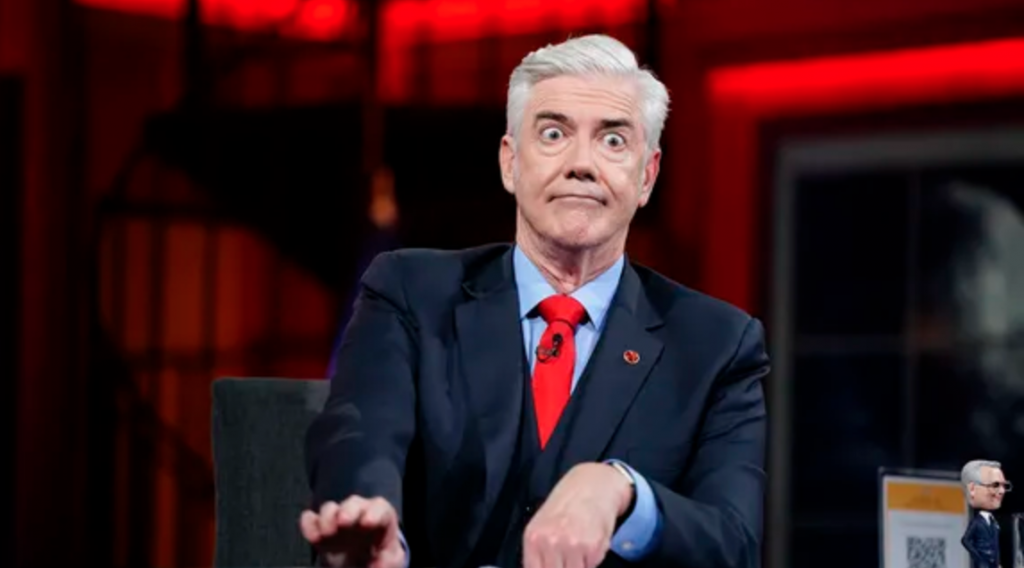
Well okay, there was one thing maybe worth a quick mention: there’s a certain kind of satire best described as “telling it like it is”, where you take the structure of the thing you’re making fun of and make the hidden message obvious. You know, you make a fake Harvey Norman ad and you fill it with references to boss Gerry Harvey telling poor people to fuck off and so on. Hilarious!
This kind of thing can be hit and miss, mostly because it’s usually just cheap shots at obvious targets. The audience already knows both sides of the joke – who you’re talking about, and what you’re talking about – with the laughs coming from the fact you’re somehow exposing their real selves. Considering the increasing shamelessness of our politicians and pretty much everyone else in public life, good luck with that.
There’s not a whole lot of mileage to be had in repeatedly making fun of Gerry Harvey because it’s all out in the open. He says what he likes safe in the knowledge that his wealth and power will protect him from any real repercussions. He doesn’t really care that you’re making fun of him, which takes away the “fun” part of making fun of him.
Likewise, a lot of the time there’s not a lot of comedy to be mined from taking this approach to politicians because politicians themselves are often happy to have their political beliefs (if they have any) mocked – it’s a great way to advertise their beliefs to voters who actually agree with them. Not to mention this kind of thing usually leads to the actual politician wanting to get involved to show they’re a good sport, and we’re back to there being no fun in the making fun part of the joke.
A smarter way to go about it is to use the public’s familiarity with one aspect of what you’re parodying to bring another aspect into the light. This is what Clarke & Dawe did so well: more often than not the target of their comedy was as much how politicians say things as what they were saying, the roundabout way they refuse to go beyond a certain point but always seem frustrated that their message – which they can’t come out and say because it’s usually a variation on “fuck everyone else” – isn’t getting through. They didn’t have to be specific in their impersonations because what they were making fun of is something pretty much all public figures have in common; the comedy came from recognising the bullshit, spin-addled way they all speak.
And then there’s this:
Sure, the jokes are funny and as soon as our local library has a copy free we’ll totally get onto reviewing Tosh’s book, but a big part of why this works is because it’s giving the ABC a much deserved (in this case) kicking.
For one thing, even if you don’t have a problem with the content, the iView ad this sketch is parodying is shit. Charlie Pickering as “cool dude” is painfully try hard at the best of times. This ad? Not the best of times. Who’s it even aimed at? Old people (AKA “ABC viewers”) don’t trust Pickering because nobody trusts Pickering; young people are just going to make up a fake login if they don’t give up on iView entirely. So mocking him gets the thumbs up.
More importantly, the sketch works because it’s pointing out things the object of the satire would rather weren’t mentioned. Yes, maybe the ABC just wants our data to help them figure out what their viewers actually want to see (here’s a guess: more UK murder shows?). Still, pointing out that the government is shit at keeping data private and literally everyone else who wants this kind of information is planning to sell it to advertisers and other “interested bodies” is completely fair game.
There’s been a shift in recent years towards more thoughtful, reflective, insightful comedy and that’s all well and good, but if you’re doing satire a big part of what you’re doing is making fun of people in a mean way (the trick is to find people who deserve it and make fun of what they do not who they are). Long story short, if you’re going to make comedy where the joke is that you’re saying the quiet part out loud, it really helps if your target isn’t already going around loudly saying the quiet part.
So bad news there for anyone looking to make satire in Australia.
New original comedy? Amazing! No, Amazon
Last week we heard the news that Amazon Prime Video is investing $150 million in seven original local shows. Amongst the shows announced at a Sydney launch event were three, count them, three comedies:
Among the commissions are documentaries Burning and Warriors On The Field, four-part docuseries Head Above Water, drama series The Lost Flowers of Alice Hart, and comedy series The Moth Effect, Deadloch, and Class of ‘07.
The comedies are described as follows:
Class of ‘07: An eight-part Australian original comedy series that will commence filming in Australia this December. Class of ‘07 is created by writer and director Kacie Anning (Upload, The Other Guy) and produced by Matchbox Pictures. When an apocalyptic tidal wave hits during the ten-year reunion of an all-girls high school, a group of women must find a way to survive on the island peak of their high school campus. Like Lord of the Flies (in cocktail dresses), the series follows a group of former classmates, now freshly entangled in decade-old drama, as they attempt to survive not just the apocalypse but each other.
Deadloch: A comedy series written by Kate McCartney and Kate McLennan and produced by Guesswork Television, OK Great Productions, and Amazon Studios. ‘The Kates’ latest creation is a feminist noir comedy set against a bucolic backdrop with a rising body count. Filming of the eight-part series will commence in Tasmania this November.
The Moth Effect: A satirical six-part sketch comedy produced by Bunya Entertainment, Amazon Studios and created by Nick Boshier (Bondi Hipsters) and Jazz Twemlow (Tonightly). The Moth Effect will launch one episode per month premiering on July 30 on Prime Video in Australia and select countries around the world. The series will showcase some of Australia and New Zealand’s finest talent including Bryan Brown, Miranda Otto, David Wenham, Ben Lawson, Jonny Brugh, Peter O’Brien, Kate Box, Sam Cotton, Christiaan van Vuuren, Sarah Bishop, Nazeem Hussain, David Woodhead and Zoë Coombs Marr.
Oh boy is it hard to get excited about a new sitcom from the writer/director of The Other Guy, a series that dared to explore just how tedious a sitcom about an entitled man-boy can be (answer: very). Whether the same writer/director can make Class of ’07, a sitcom about a group of women at a school reunion, less tedious than The Other Guy, well…hopefully.
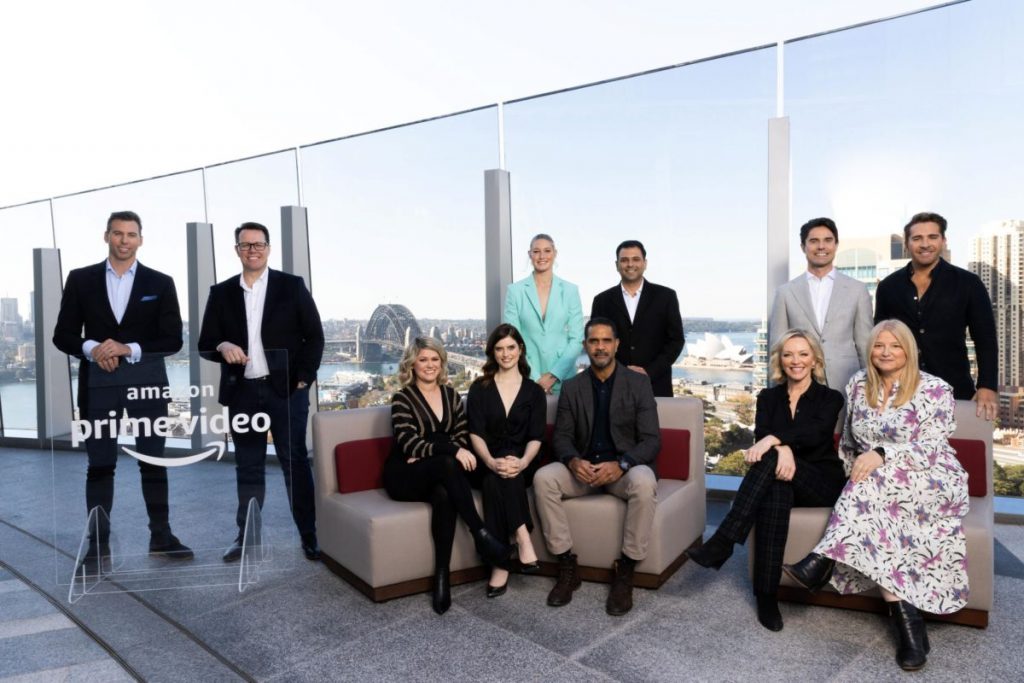
Put it this way, we’d feel a lot more confident if Kate McCartney and Kate McLennan were in charge. They recently proved with Slushy that they have range beyond the hard-edged political comment of Get Krack!n, so they should have no trouble making us laugh with Deadloch a parody of Northern European police procedurals.
As for The Moth Effect, anything new in the world of sketch comedy is welcome, even if this show does seem to be selling itself more on its big-name actor stars than its roster of actual, decent comedians (Zoë Coombs Marr, the only decent thing in the most recent series of The Weekly amongst them).
Vale The Weekly 2021
This year all the blame fell on Charlie Pickering’s shoulders. Who else was left? Even the regular guests only turned up for a handful of episodes across the season; otherwise it was, as the title had always said from the start, the Charlie Pickering show. And what a show it was.
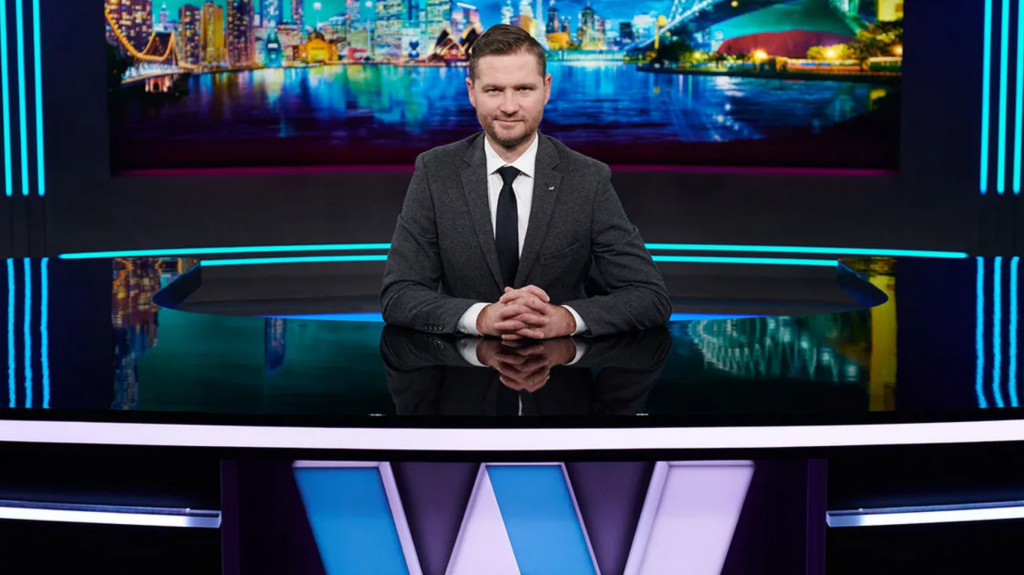
Wait, we mean what, that was the show? Pickering spent at least half of every episode recapping the previous week by basically reading out the actual news reports – only you could tell it was comedy because he was smirking while he did it. “You give us thirty minutes, we’ll give you the shits”.
Then he moved into “the lounge” to slip into an earnest expression while he spent a good chunk of the show explaining that things were, you know, complicated and you couldn’t believe everything you read on the internet… unless you read the same things he did, in which case you already knew everything he had to say. Let’s make a joke about how the Tour de France is so boring it put Pickering to sleep… then spend five more minutes talking about it! You can’t fail with that.
There’s nothing intrinsically wrong with the basic idea of a satirical news recap. You could even argue that Pickering’s material was slightly – slightly – stronger now that the focus was firmly on “here’s what only just happened”. But Pickering isn’t the person to host it. Pickering isn’t even the person to watch it.
Considering Pickering pretty much picked up the ABC Satirical Torch from The Chaser, it’s more than possible that the higher-ups at the ABC see “smug well-off private schoolboy” as a useful worldview for satire. We beg to differ, mostly because having failed to get into the housing market we need all the begging practice we can get. Remember when The Weekly used to make jokes about house prices? Hilarious stuff.
Speaking of total fucking embarrassments, we didn’t think it was possible to sink lower than Corona Cops but of course The Weekly‘s comedy bathyscaphe was all fueled up and ready to plumb new depths. “Ha ha, let’s get a snooty film reviewer to cover trash television” is the kind of thing a chump might say once and expect to get away with it, but The Weekly kept bringing Margaret (“stop picking on my son’s movie“) Pomeranz back to do a joke that wasn’t all that funny when she teamed up with sparring partner David Stratton to review “2020” for The Shovel last year.
But hey, clearly the team at The Weekly thought it was good enough to rip off again and again, right? Unless they’d been sitting on it for a while but didn’t want to step on the toes of now-departed ABC Comedy Chief Rick Kalowski – after all, he’d used Pomeranz (well, impersonations of her) to make basically the same joke on both Double Take and Wednesday Night Fever. At least he didn’t come up with the “all new” idea of getting some smooth dude to deliver bad news.
This kind of news recap needs a spark Pickering’s never shown. In the battle between smug and couldn’t give a fuck, Pickering’s face waved the white flag years ago. Now more than ever, the news is little more than a string of things to get angry and outraged about (as the entire internet has known since 2011) and yet the ABC’s big satirical gun just sits back with an eyebrow raised and says “it’s a funny old world” after yet another story about outrageous levels of entrenched corruption at the highest levels of government.
Sure, the people benefiting from the shitty way things are deserve a chance to tell their side of the story. That’s what News Corp, Nine / Fairfax, Channel Seven and literally every other media organisation in the country do all day every day. It’s too late for the ABC to join the big boy club; the big boys want them shut down. So what if they – and it’s a crazy thought but hear us out – put on a news recap that actually challenged the status quo instead of begged to join it?
But then you’d have to sack Pickering, and who’d front the ABC’s ads for their new “totally secure” login requirements for iView then?
It’s a Fraud, I Tell You!
Why would you make a movie in Australia? Sure, there’s generous tax breaks, plenty of skilled tech crew, stunning locations, loads of moderately skilled actors, even- okay, let’s start again. Why would you make an Australian movie in Australia?
We got to wondering this while watching Fraud Festival on C31 last Sunday night (you can also catch it here). It’s a perfectly amusing mockumentary loosely (extremely loosely) satirising the Fyre Festival debacle of a few years back, only this time the crap festival is being held to save the suburb of Coburt from being demolished for a massive highway. Do they do the comedy bit where a scale model of the sleepy suburb has a giant flat chunk of road smashed down on it? Yes they do – and it’s Tony Martin holding the board.
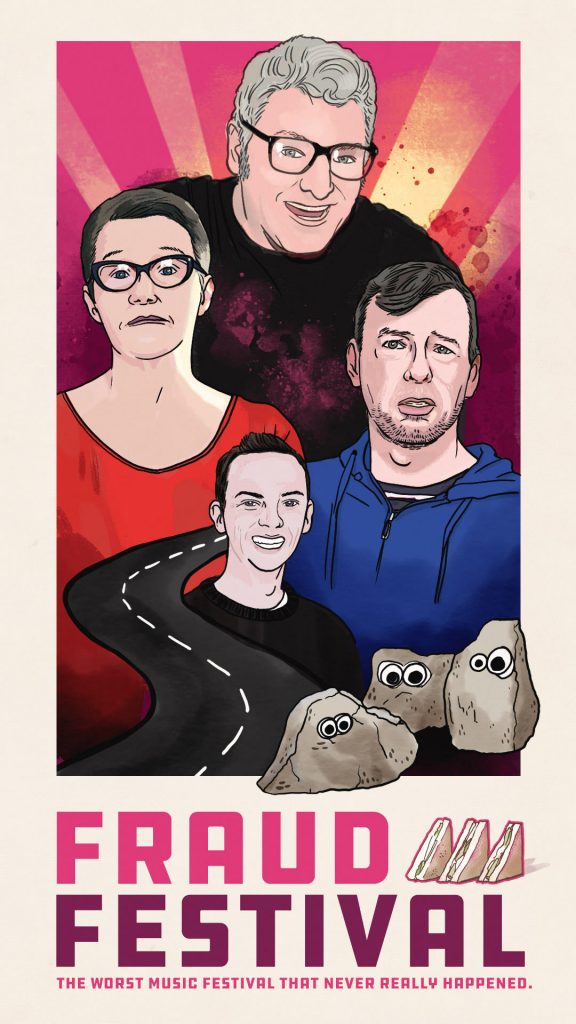
Fraud Festival has a lot of obvious things going for it, by which we mean there are a lot of cameos and brief appearances from comedians you’ll recognise. It also has a fairly decent plot, in that things keep on happening, and there’s even a bunch of quality jokes in there even though it’s clear just about every scene was largely improvised. So it’s a decent movie? Oh hell no.
The movie format is currently the absolute worst format you can get when it comes to comedy. We all remember fondly all manner of classic comedy movies; we might even remember seeing some of them at the cinema. But at the moment, right now, comedy movies do not make it to cinemas… or much of anywhere else.
There are plenty of reasons why, but the (current) big one is that there are no big comedy stars who can get people to go to a movie. Comedies have nothing to offer marketing-wise aside from big stars – just check out the trailer for any comedy and no matter how funny the actual film, you’ll be watching at least 30 seconds of dead air – and movies don’t get to cinemas (or anywhere else) without marketing.
If you want to make visual comedy that people will watch and think “hey, that funny person deserves more work”, then it’s off to YouTube (or even TikTok) with you. Those kind of places are ideal for sketch comedy, which is why they’re the only places sketch comedy now exists. And if you want to do longer pieces – time to break your dream project into episodes.
Australian movies are made as calling cards. They’re calling cards for the cast and crew to try and get work in the US, they’re calling cards for the locations (many if not most Australian films get funding from tourism bodies and the like), they’re calling cards for the funding bodies to show off their taste and refinement when it comes to funding “quality Australian productions”. Comedy is next to useless in any of those roles, which is why even Australian “comedy” movies are really just dramas with a couple of jokes sprinkled in (yes, we’ve seen the trailers for June Again).
Plus now “feature film” tends to mean things like “good lighting” and “fancy locations” and “high production values”, which we’d argue aren’t essential to making a classic film (The Castle looks a bit cheap even by the standards of the time) but these days are essential if you’re going to get your foot in the door. Put it this way: these days a shithouse movie that looks good is always going to do better than a funny movie that looks shit.
So while for us the fact that Fraud Festival had some good laughs – it’s safe to say Emily Taheny’s “Fat Asian Baby” song was funnier than all of Aftertaste – is a big plus, in the outside world a comedy movie is just kind of a curio at best. Which is a bit grim, because 10-15 years ago comedies were going gangbusters at the box office worldwide.
And now they’re dead. We never should have let them make You and Your Stupid Mate.
Slush puppies
Slushy, Kate McLennan and Kate McCartney’s new audio comedy series for Audible, is set on an Antarctic research station, but, really, it could be set in any workplace. For Slushy isn’t about how hilarious it is to research penguins; it’s about people. From those who are anxious, depressed and inadequate, to those who are arrogant, pretentious and idiotic, all the characters in the Slushy universe are just trying to survive.
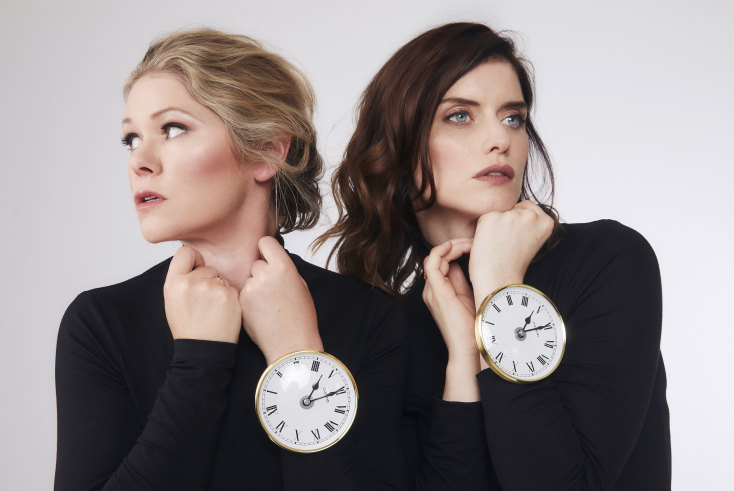
Central to the story is Maya (Pallavi Sharda), a drama school drop-out and retail worker who lied her way into a job as a research assistant on the station’s penguin program. Constantly on edge and with no discernible talent or aptitude for the world of scientific research, Maya bumbles her way around the base and its out-stations, forced to endure all manner of hardships.
These hardships are mostly in the form of her colleagues, such as Kyle (Greg Larsen), a particularly well-drawn example of the sort of ambitious, brazen grifter who habitually tells his colleagues he’s more senior than he actually is. Also at the station is Embeth (Kate McCartney), a pretentious, sex-obsessed weirdo, who’s there as the artist in residence, Kehan (Dilruk Jayasinha), an anxious, pedantic researcher, Claire (Zoe Coombs Marr), a depressive who’s worried about the climate crisis, Murray (Shaun Micallef), a grumpy older man who just wants to be left alone to do his work, Nat (Kate McLennan), a sort of Jill-of-All-Trades, who ends up doing everything from running the station’s bar to being the resident hairdresser, and Mary (Rebecca Massey), the unflappable Head of Station.
These and a number of other characters (played by Eddie Perfect, Dave Lawson, Anne Edmonds and others), form the core of the series, popping-up to help and hinder Maya as she arrives on station, completes basic training, and then finally has to do some work. If you call trying to count thousands of penguins who are constantly moving, at the behest of your tough-as-nails, terrifying boss, Catherine (Kris McQuade), work
But, like we said above, the work of the station isn’t really the point here. Slushy is a show about having to get on with others, and occasionally trying to get it on with others (top marks to the cameo from Paul F. Tompkins as sleezy American pilot Rick, by the way, a classic McLennan/McCartney parody of an alpha male).
If you’re a fan of McLennan and McCartney’s previous work like Get Krack!n (has it really been two years since Get Krack!n?), then be prepared because Slushy is a little different in tone. It’s less hard-edged and less-political, even if it’s still got plenty to say about traditional gender roles and the climate crisis. In fact, Slushy might be a show to recommend to someone who didn’t like Get Krack!n, and prefers their satire a bit softer and their laughs a bit lighter.
Slushy is the trad sitcom we’re slightly surprised McLennan and McCartney wrote. Having said that, the final couple of episodes of Get Krack!n were a sort of an acknowledgement that they couldn’t stay on that particular comic path forever, so maybe this change of direction shouldn’t come as a surprise? The important point, though, is that Slushy is funny. And laughs are always good.
Wogs (not) Out Of Work
Press release time!
New Superwog hits ABC iview on June 13
Off the back of their smash hit #1 trending first season, ABC is delighted to announce that the second season of the irreverent comedy series – Superwog – drops Sunday 13 June with all episodes available to binge from 6pm on ABC iview. Created by and starring brothers Theodore and Nathan Saidden, the new series dives into Superwog and his Dad’s misadventures as they chase their passions, test their friendships, fight with relatives and butt heads with authorities. The new season is guaranteed to make you squirm and laugh!
Produced by Superwog and Princess Pictures, the six-part series follows a highly dysfunctional family tackling life in Australian suburbia, often head on. Superwog (Theodore Saidden) and Johnny (Nathan Saidden) are best friends and newly minted adults who still fight with their parents and watch too much TV. But now they’re also taking their driving tests, romancing cheerleaders and trying to stay one step ahead of the law.
Production credits: A Superwog and Princess Pictures production for the ABC with major production funding from the ABC in association with Screen Australia, and financed with support from Film Victoria and Screen NSW. Created, written, co-produced by and starring Theodore Saidden and Nathan Saidden. Produced by Mike Cowap and Antje Kulpe. Directed by Theodore Saidden. Executive Producers Emma Fitzsimons, Elia Eliades and Katherine Dale. ABC Executive Producers Andrew Gregory and Lauren Merolli. ABC Head of Comedy Todd Abbott.
Season Two of Superwog will premiere on ABC iview on Sunday 13 June at 6pm AEST with all episodes available to binge. The series will be broadcast on ABC TV from Wednesday 16 June at 9.30pm. Season One of Superwog is available on ABC iview now.
There’s a particularly tricky hurdle for comedians when they base their act on being wacky young dudes (it’s almost always dudes) – they wake up one morning and suddenly they’re too old for their material and everything gets awkward and creepy. Will this be that hurdle for Superwog? Let’s find out!

